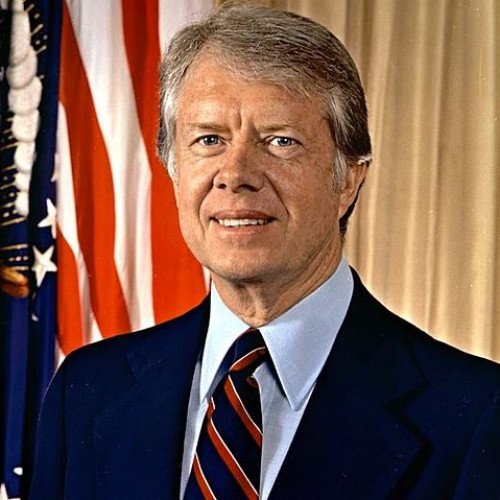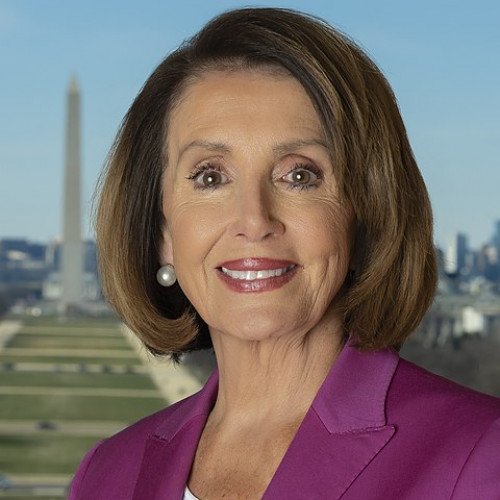Jimmy Carter VS Nancy Pelosi

Jimmy Carter
James Earl Carter Jr. (born October 1, 1924) is an American politician and philanthropist who served as the 39th president of the United States from 1977 to 1981. A member of the Democratic Party, he previously served as a Georgia State Senator from 1963 to 1967 and as the 76th governor of Georgia from 1971 to 1975. Since leaving the presidency, Carter has remained engaged in political and social projects as a private citizen. In 2002, he was awarded the Nobel Peace Prize for his work in co-founding the Carter Center. Raised in Plains, Georgia, Carter graduated from the United States Naval Academy in 1946 with a Bachelor of Science degree and joined the United States Navy, where he served on submarines. After the death of his father in 1953, Carter left his naval career and returned home to Georgia to take up the reins of his family's peanut-growing business. Carter inherited comparatively little due to his father's forgiveness of debts and the division of the estate among the children. Nevertheless, his ambition to expand and grow the Carters' peanut business was fulfilled. During this period, Carter was motivated to oppose the political climate of racial segregation and support the growing civil rights movement. He became an activist within the Democratic Party. From 1963 to 1967, Carter served in the Georgia State Senate, and in 1970, he was elected as Governor of Georgia, defeating former Governor Carl Sanders in the Democratic primary on an anti-segregation platform advocating affirmative action for ethnic minorities. Carter remained as governor until 1975. Despite being a dark-horse candidate who was little known outside of Georgia at the start of the campaign, Carter won the 1976 Democratic presidential nomination. In the general election, Carter ran as an outsider and narrowly defeated incumbent Republican President Gerald Ford. On his second day in office, Carter pardoned all the Vietnam War draft evaders by issuing Proclamation 4483. During Carter's term as president, two new cabinet-level departments, the Department of Energy and the Department of Education, were established. He established a national energy policy that included conservation, price control, and new technology. In foreign affairs, Carter pursued the Camp David Accords, the Panama Canal Treaties, the second round of Strategic Arms Limitation Talks (SALT II), and the return of the Panama Canal Zone to Panama. On the economic front, he confronted stagflation, a persistent combination of high inflation, high unemployment and slow growth. The end of his presidential tenure was marked by the 1979–1981 Iran hostage crisis, the 1979 energy crisis, the Three Mile Island nuclear accident, and the Soviet invasion of Afghanistan. In response to the invasion, Carter escalated the Cold War when he ended détente, imposed a grain embargo against the Soviets, enunciated the Carter Doctrine, and led a 1980 Summer Olympics boycott in Moscow. In 1980, Carter faced a challenge from Senator Ted Kennedy in the primaries, but he won re-nomination at the 1980 Democratic National Convention. Carter lost the general election to Republican nominee Ronald Reagan in an electoral landslide. He is the only president in American history to serve a full term of office and never appoint a justice to the Supreme Court. Polls of historians and political scientists usually rank Carter as a below-average president. Carter's activities since leaving the presidency have been viewed more favorably than his presidency itself. In 1982, Carter established the Carter Center to promote and expand human rights. He has traveled extensively to conduct peace negotiations, monitor elections, and advance disease prevention and eradication in developing nations. Carter is considered a key figure in the Habitat for Humanity charity. He has written over 30 books, ranging from political memoirs to poetry, while continuing to actively comment on ongoing American and global affairs such as the Israeli-Palestinian conflict.
Statistics for this Xoptio

Nancy Pelosi
Nancy Patricia Pelosi (; née D'Alesandro; born March 26, 1940) is an American politician serving as Speaker of the United States House of Representatives since 2019, and previously from 2007 to 2011. Pelosi has served as a U.S. representative from California since 1987. A member of the Democratic Party, she is the only woman in U.S. history to serve as Speaker and, until the inauguration of Kamala Harris as vice president, was the highest-ranking female elected official in United States history. As House Speaker, Pelosi is second in the presidential line of succession, after the vice president.Pelosi was first elected to Congress in 1987, following her father, Thomas D'Alesandro Jr., who served as a U.S. representative from Maryland and Mayor of Baltimore, into politics. She is the dean of California's congressional delegation, having begun her 18th term in 2021. Pelosi represents California's 12th congressional district, which comprises four-fifths of the city and county of San Francisco. She initially represented the 5th district (1987–1993), and then, when district boundaries were redrawn after the 1990 Census, the 8th district (1993–2013). Pelosi has led the House Democrats since 2003—the first woman to lead a party in Congress—serving twice each as House minority leader (2003–2007 and 2011–2019) and as Speaker (2007–2011 and since 2019). Pelosi was a major opponent of the Iraq War as well as the Bush administration's 2005 attempt to partially privatize Social Security. During her first speakership, she was instrumental in the passage of many of the Obama administration's landmark bills, including the Affordable Care Act, the Dodd–Frank Wall Street Reform and Consumer Protection Act, the Don't Ask, Don't Tell Repeal Act, the American Recovery and Reinvestment Act, and the 2010 Tax Relief Act. Pelosi lost the speakership in 2011 after the Republican Party won a majority in the House of Representatives in the 2010 elections. But she retained her role as leader of the House Democratic Caucus and returned to the role of House minority leader. In the 2018 midterm elections, the Democrats regained control of the House. When the 116th Congress convened on January 3, 2019, Pelosi was again elected Speaker, becoming the first former Speaker to return to the post since Sam Rayburn in 1955. Under Pelosi's leadership, the House of Representatives impeached President Donald Trump, first on December 18, 2019, and again on January 13, 2021.On January 3, 2021, Pelosi was reelected to a fourth term as Speaker of the House, which is expected to be her last, after a deal with progressives.